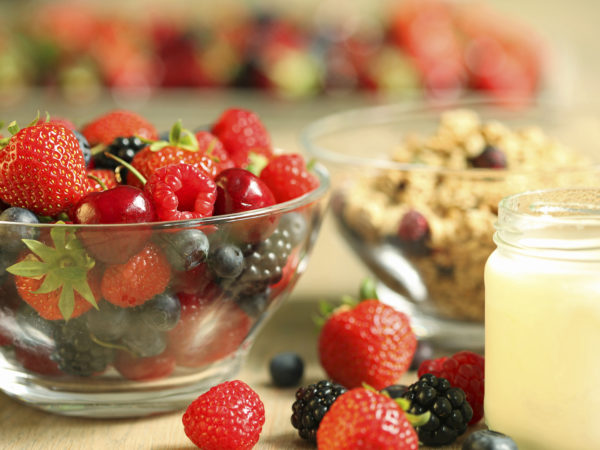Breakfast Of Champions

An excerpt from Foodist, Chapter 10: Breakfast of Champions
Breakfast is your slam dunk meal. It’s fast, it’s simple, and healthy choices are usually delicious. Affordable breakfast supplies are available almost anywhere, and special equipment isn’t necessary. Most important, if you make a healthy breakfast one of your home court habits, you virtually guarantee that 30% of your daily meals are healthy and contributing positively to your healthstyle. Since automatic health is what we’re after, breakfast is a foodist’s best friend.
An ideal breakfast has a low glycemic load and contains a good amount of protein. Not only does this encourage your body to use your breakfast calories as fuel rather than storing them as fat, it also improves your metabolic response to subsequent meals throughout the day. This means that one consequence of eating a healthy breakfast is that no matter what you choose for lunch (and possibly dinner), your body will handle it a little better than it would have if you ate something made of processed grains and sugars, or skipped breakfast all together. That’s pretty powerful. Of course this doesn’t mean that you should use breakfast as an excuse to eat an unhealthy lunch. You should generally use your home court advantage and try to eat as healthy as possible when in your regular routine. But small, positive impacts do add up and over the long run work to sensitize your body to insulin and improve metabolism.
Just as important, healthy habits beget more healthy habits. Starting the day with a positive healthy action might inspire you to pack a healthier lunch, or cut back on the sugar in your coffee. These may feel like small acts, but they can have a huge psychological impact on your ability to make progress and could ultimately influence what you buy later at the grocery store, or help you choose the gym over laying on the couch with a bag of chips. Never underestimate the power of baby steps.
As long as you’re eating real, whole foods and not processed junk, what exactly you choose for breakfast doesn’t matter much. I recommend finding a few simple breakfast options you enjoy that you can put together while you’re practically asleep. My personal breakfast choices tend to cycle every year or so. Currently I’m in the habit of making my own muesli, to which I add a little water and then microwave for two minutes. It cooks up just like oatmeal, only it’s tastier because it is filled with nuts, seeds and raisins. I top it with a generous heap of cinnamon and a splash of unsweetened hemp milk. It’s delicious and keeps me satisfied for hours. In the past I used to sprinkle a smaller amount of dry muesli onto a serving of plain yogurt. Once you stir it around the muesli softens and the mix is really tasty. It’s good with cinnamon or fruit as well.
Scrambling, frying or boiling eggs is another easy, tasty and satisfying breakfast. I typically pair them with something spicy like salsa or kimchi, and something green like sautéed kale. Try sprinkling a little smoked paprika on a fried egg for an absolutely mind-blowing breakfast experience. If I don’t have any greens I’ll sometimes make a quick bean or lentil salad by adding a few chopped herbs and vegetables (think carrots, cucumber, tomato, etc.), with a splash of oil and vinegar. Just place your fried egg right
on top of the pile and dig in. Yum. Whatever you choose to have for breakfast just make sure you enjoy it, because habits don’t form without a reward.
What If I’m Not Hungry In The Morning?
If you aren’t in the habit of eating first thing in the morning it can sometimes be difficult to start. Many people complain that they are not hungry in the morning and forcing themselves to eat makes them nauseated. There could be a few reasons for this. Dehydration is a common reason for people to not feel hungry in the morning. Get in the habit of drinking plenty of water, particularly before bed and in the morning. Another reason you may not be hungry in the morning is if you’ve eaten too large a dinner or stopped eating too late at night. These things can also be associated with insomnia, so if you are having trouble sleeping eating a lighter, earlier dinner might be helpful. Make an effort to build consistent eating habits so that all your meals occur at roughly the same time each day. If you get to the point where you wake up hungry in the morning, you know you are making progress.
by Darya Rose, PhD
Darya is the author of the new book, Foodist: Using Real Food and Real Science to Lose Weight Without Dieting. Her popular blog, Summer Tomato was named one of TIME Magazine’s 50 Best Websites in 2011. Darya is a neuroscience Ph.D, San Francisco foodist, health enthusiast, wine lover & geek girl. Find her on Twitter and Facebook.









